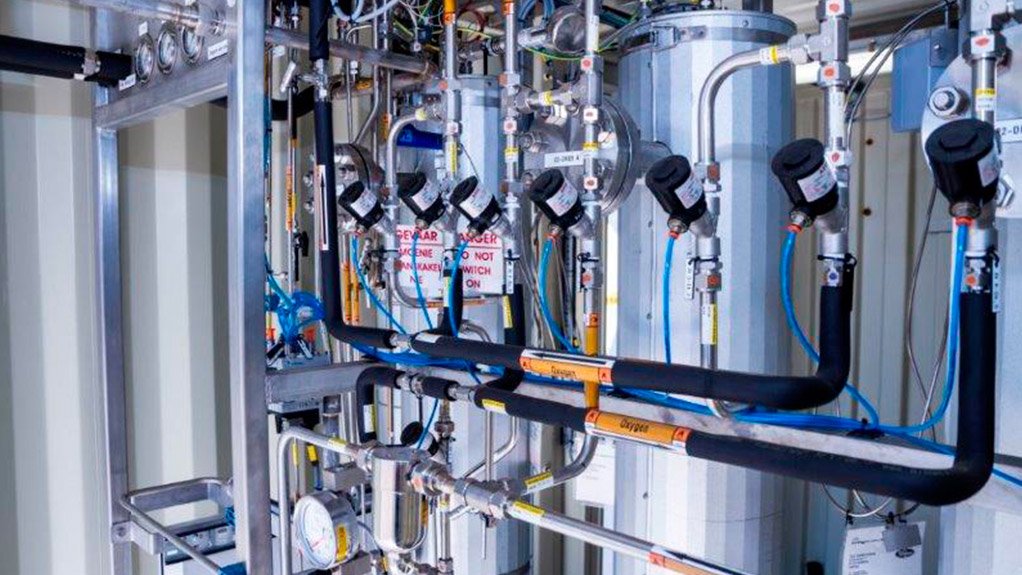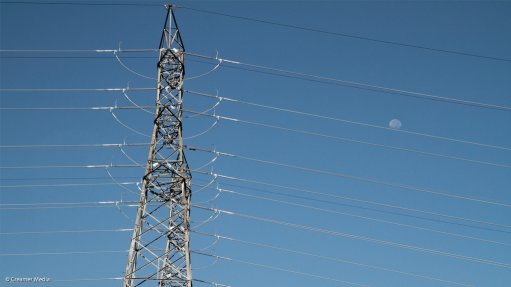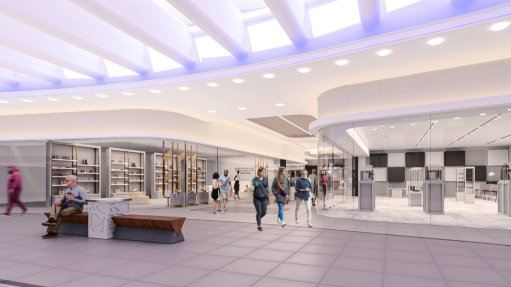New SA hydrogen and oxygen plant unveiled
South African gas and welding products company Afrox, part of the German Linde group, publicly unveiled its new R14-million high-purity hydrogen and oxygen plant at Pelindaba, west of Pretoria, on Thursday. The new plant uses latest-generation electrolysis technology.
"We had a hydrogen plant, but we had it for some 40 years and we needed a new plant with new technology," explained Afrox business manager: special products and chemicals Jaco Coetzee. "The new plant produces significantly higher purity gas, which we are very happy with." The new plant provides hydrogen and oxygen with a purity of 99.999%.
The new technology also means the new plant is much more efficient than the plant it has replaced. The new facility uses only 20% of the electricity consumed by its predecessor.
The main customers for the hydrogen and oxygen produced by the new plant are the petrochemicals industry, laboratories and universities. But the company is also optimistic about future opportunities in clean energy, both with the use of hydrogen itself as a fuel and with the production of fuel cells, to meet decentralised power requirements.
Currently, the plant is running at less than 50% capacity and so has considerable scope to meet increasing demand. As it is modular, it can easily be expanded when demand exceeds the current capacity.
Authorisation to acquire the new plant was granted in late 2012. It was then ordered from specialist Belgian company Hydrogenics. Delivered from Belgium and installed at the Afrox site at Pelindaba, it started operating in April.
The entire plant is contained in three containers -- one of forty feet and two each of twenty feet in length. The forty foot container incorporates a control point, a water demineraliser, four electrolysers and a hydrogen scrubber unit. One of the twenty foot containers holds an oxygen scrubber and the other a compressor.
The plant is entirely automatic, and shuts down and depressurises itself should it detect any problems or issues. However, human operators check all the plant's parameters every three hours.
The electrolysis process uses potassium hydroxide as the electrolyte. In the process, the demineralised water is combined with the potassium hydroxide and electricity is applied. The resulting gases are removed and sent to the scrubbers to ensure the highest possible purity, while the electrolyte is retained. The plant is so designed that it only needs to be supplied with new electrolyte every five years.
The demineralised water is created by taking tap water and passing it through a 25 micron filter, a carbon filter, a five micron filter and then through a reverse osmosis membrane. Then the water is passed through tanks of mixed bed resin. The end result is totally demineralised water.
The plant's current production capacity is about 5.5 kg/h. It is located on the South African Nuclear Energy Corporation (Necsa) complex at Pelindaba for reasons of safety. Necsa is not a customer for the plant.
Article Enquiry
Email Article
Save Article
Feedback
To advertise email advertising@creamermedia.co.za or click here
Press Office
Announcements
What's On
Subscribe to improve your user experience...
Option 1 (equivalent of R125 a month):
Receive a weekly copy of Creamer Media's Engineering News & Mining Weekly magazine
(print copy for those in South Africa and e-magazine for those outside of South Africa)
Receive daily email newsletters
Access to full search results
Access archive of magazine back copies
Access to Projects in Progress
Access to ONE Research Report of your choice in PDF format
Option 2 (equivalent of R375 a month):
All benefits from Option 1
PLUS
Access to Creamer Media's Research Channel Africa for ALL Research Reports, in PDF format, on various industrial and mining sectors
including Electricity; Water; Energy Transition; Hydrogen; Roads, Rail and Ports; Coal; Gold; Platinum; Battery Metals; etc.
Already a subscriber?
Forgotten your password?
Receive weekly copy of Creamer Media's Engineering News & Mining Weekly magazine (print copy for those in South Africa and e-magazine for those outside of South Africa)
➕
Recieve daily email newsletters
➕
Access to full search results
➕
Access archive of magazine back copies
➕
Access to Projects in Progress
➕
Access to ONE Research Report of your choice in PDF format
RESEARCH CHANNEL AFRICA
R4500 (equivalent of R375 a month)
SUBSCRIBEAll benefits from Option 1
➕
Access to Creamer Media's Research Channel Africa for ALL Research Reports on various industrial and mining sectors, in PDF format, including on:
Electricity
➕
Water
➕
Energy Transition
➕
Hydrogen
➕
Roads, Rail and Ports
➕
Coal
➕
Gold
➕
Platinum
➕
Battery Metals
➕
etc.
Receive all benefits from Option 1 or Option 2 delivered to numerous people at your company
➕
Multiple User names and Passwords for simultaneous log-ins
➕
Intranet integration access to all in your organisation




















